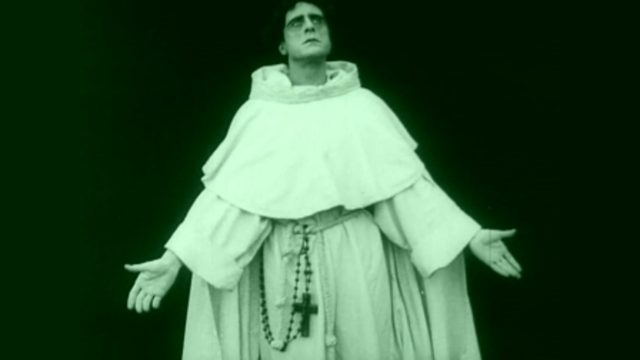Monday Movie: Hypocrites, by David Bax
In many ways more a sermon than a story, 1915’s Hypocrites is nevertheless a stunning example of the work of Lois Weber, one of early cinema’s most successful and respected directors, whose contributions and importance have been shamefully papered over.
Hypocrites begins with two parallel narratives (with many of the actors appearing in dual roles). In the Middle Ages, a monk (Courtenay Foote) is eager to reveal a new statue to his fellow believers and folks from the surrounding area. When the work, a likeness of a nude woman called “TRUTH,” is displayed, though, the people riot and kill the monk. In the modern day, Foote again plays a man of the cloth, preaching about the dangers of hypocrisy to an upper middle class congregation who would rather see him removed from his position than listen to what he has to say. But then Truth herself appears to the monk/priest, in the form of a nude woman (Margaret Edwards) who takes him on a tour of modern man’s hypocrisies.
It was probably Weber’s intention, to some extent, that the 1915 public reaction to her film was not dissimilar to the one the monk’s statue got. This may have been before the Production Code but people just weren’t ready to accept a naked woman walking around for nearly half the movie. That’s too bad, though, because the technique Weber uses for these sequences is truly impressive. Edwards’ Truth is only visible via double exposure, rendering her a ghostly image next to Foote’s cleric. Double exposure was not new in 1915 but the complexity of Weber’s compositions was uncommon. Maintaining the quality of image of both Edwards and Foote while they not only move around the frame but while the camera moves as well was an impressive feat.
Weber’s mastery of technique isn’t limited to this one trick. Her framing is consistently powerful and evocative; a green tinted Foote standing, arms outstretched, on a hill with the ocean stretching out to the horizon behind him is a beautiful image. And Weber’s control, via editing, of the pacing and cadence of her movie is remarkable, especially given its unconventional narrative structure. The sometimes scolding nature of Hypocrites‘ messaging (kids these days are eating too many sweets!) makes me think that Weber may not have been the most fun party guest. But she deserves to be mentioned alongside the best and most important directors of the silent era.






























